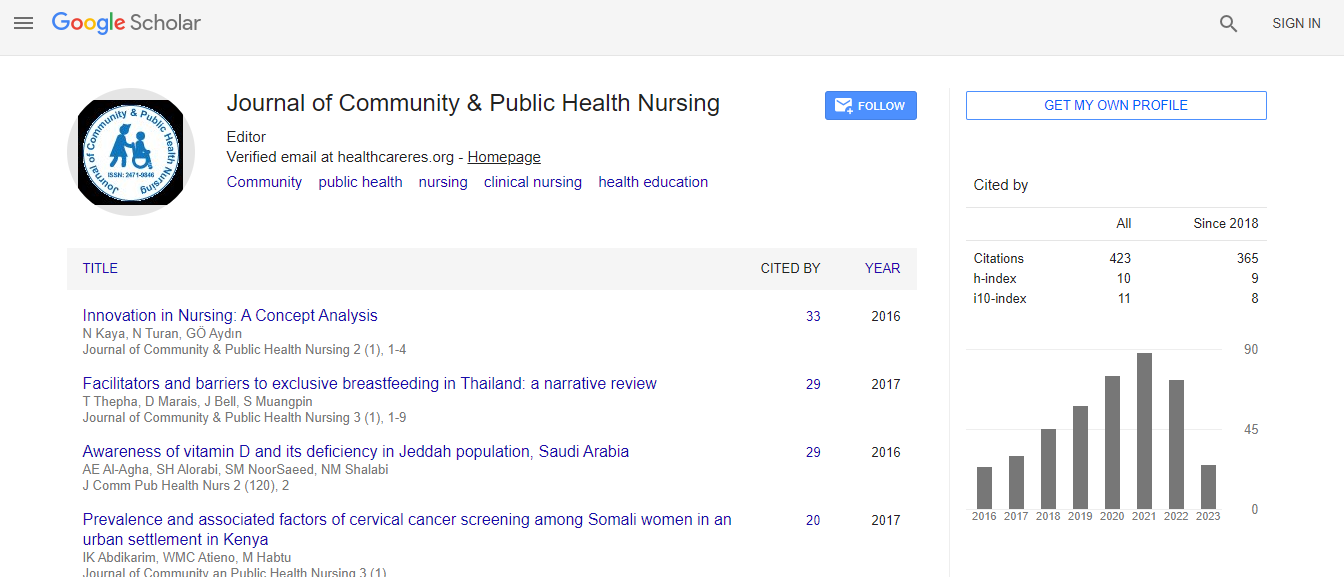Research Article
Inter-Professional Collaboration between Family Doctors and Nurses at the End of Life. Challenges of Community-Based Palliative Care in Switzerland
Vanessa Alvarado and Brigitte Liebig*
Applied Psychology, University of Applied Sciemces Northwestern Switzerland, Olten, Switzerland
*Corresponding Author:
- Brigitte Liebig
Professor, Applied Psychology
University of Applied Sciemces Northwestern Switzerland
Olten, Switzerland
Tel: 41 62 62957 23 61
E-mail: brigitte.liebig@fhnw.ch
Received date: May 18, 2016; Accepted date: May 26, 2016; Published date: May 31, 2016
Citation: Alvarado V, Liebig B (2016) Inter-Professional Collaboration between Family Doctors and Nurses at the End of Life; Challenges of Community-Based Palliative Care in Switzerland. J Comm Pub Health Nurs 2:124. doi:10.4172/2471-9846.1000124
Copyright: © 2016 Alvarado V, et al. This is an open-access article distributed under the terms of the Creative Commons Attribution License, which permits unrestricted use, distribution, and reproduction in any medium, provided the original author and source are credited.
Abstract
Inter-professional collaboration between family doctors and nurses is a decisive element of the quality in community-based palliative care. Previous research shows that professional interactions between nurses and family doctors are embedded in formal structures and social relationships, and can be challenging in terms of professional behaviour and self-concept.
While research has focussed on inter-professional collaboration in hospitals, only little is known about the premises and problems of inter-professional collaboration in community-based palliative care. This article focuses on the challenges of inter-professional collaboration between family doctors and nurses in community-based palliative care in Switzerland, using an explorative research design. 24 group discussions were conducted in 2013/14 with 91 family doctors and 72 nurses in French, Italian and German speaking language regions of Switzerland. The care givers were asked about their everyday experiences and perspectives. For the interpretation of data qualitative content analysis has been applied.
Results show that inter-professional collaboration in community-based palliative care is highly challenging due to different factors: First of all deficits related to organizational aspects of work constitute a source for conflict: The asynchrony of working hours of family doctors and nurses prevent personal contact, communication and trust building. More than that different professional values regarding palliative care and dying can cause disturbances in collaboration and affect the personal relationship between professionals negatively. Uncertainties regarding leadership and a failure of meta-communication provide further impediments for inter-professional collaboration. The article provides recommendations how to support and instruct collaborative processes between family doctors and nurses in end-of-life care.

 Spanish
Spanish  Chinese
Chinese  Russian
Russian  German
German  French
French  Japanese
Japanese  Portuguese
Portuguese  Hindi
Hindi 
